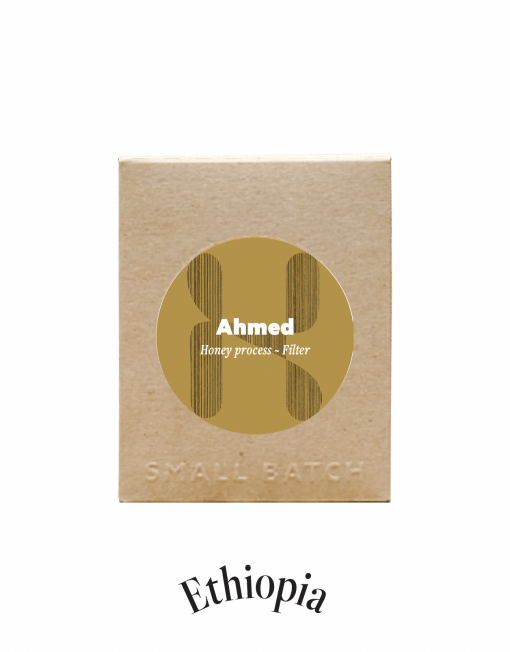Ahmed Abatemam – Honey Filter
$23–$78
Ahmed Abatemam – Honey Filter
$23–$78
- Producer Ahmed Abatemam
- Attributes Honey-processed, bed-dried, 74110 & 74112 cultivars
- Origin Agaro, Jimma [Ethiopia]
- Flavours floral and subtle with a little bush herb and spice and a lively mouthfeel
It’s always a treat for us to feature coffees that we’ve purchased directly from small scale farmers/producers.
And it’s a greater treat than normal when these direct purchases are of Ethiopian coffees. Not just because Ethiopia is endowed with diverse, stunning and complex varietals and profiles (being the botanical birthplace of coffee after all), but because until recently it was impossible to buy this way in this country.
In fact, we first met Dome, Kalid, and Ahmed Abatemam three or so years ago, when the brothers were in their first year of newly-legalised direct export sales. They were already doing a “specialty” coffee process (Ethiopia knows no other way), but they were only able to sell their coffee locally, to other exporters. After tasting the quality of the harvest in 2018, we jumped at the opportunity to work with them and made a small purchase. Unfortunately the coffee that arrived 6 months later was below our quality standards to sell. Undeterred, and trusting in the inherent quality of the brothers’ product, we resolved to implement some stronger quality assurance measures and work harder to understand the many complications of Ethiopian export.
This purchase, then, required not just the multiple changes to Ethiopian export laws several years ago, it also required that we assume lots of risk and put in loads of hours pushing through the seemingly endless and labyrinthine quality assurance and export requirements. And since these efforts still don’t guarantee the coffee will arrive meeting our standards, you can imagine we are beyond stoked when it all turns out as it has on this occasion.
The Abatemam farm is located about 30 mins sou-sou-west of Agaro, near some very well known washing stations – Hunda Oli and Sedi Loya. It’s a typical Ethiopian forest wonderland: 35 hectares at an altitude of 2050 metres, forested with lots of shade trees (among them the impressive flat-canopied Albizia), and containing plenty of new plantings under the canopy.
While the coffee is ascribed to Ahmed, in truth the coffee production is a joint effort among the brothers, with Ahmed overseeing processing, Dome in charge of warehouse, sampling and sales, and Kalid managing the farm’s soil health, shade canopy and pruning.
If you haven’t come across honey-processing, let us assure you it has nothing whatsoever to do with actual honey (however good that might sound!). It’s a traditional and fairly rustic way of processing a coffee, generally resulting in a heavier texture, a fuller fruit flavour and a mellower acidity than a “washed” coffee cousin. How is it done?
Simple. With washed coffee, the fruit mucilage (the “honey” layer that remains clinging to the seed’s outside after it is liberated from the pulp and cherry skin via a depulper) is removed either mechanically or via rapid fermentation, allowing the parchment coffee to dry without external fruit influence. “Honey” coffees on the other hand are dried with the fruit mucilage (honey) left intact.
Here is how Ahmed describes the process: “During Harvest time we collect the product by picking only the mature and fully red coffee cherry seeds one by one on the coffee tree & we put it in Baskets. After that We transfer or put in the coffee in bucket with full of pure water and we separate the mature seeds from the immature one. The mature seeds come to sink the others [remain] on top. We pulp the mature seeds by pulper machine without adding water, We use seeds own natural water [mucilage]. There is no tank and no fermentation. We keep the pulped natural [aka ‘honey’] coffee under the shade for 24 hours . After that we [lay] pulped coffee on the bed … to dry by sun. it may takes a week up to 10 days. With in these processes we used only natural equipment there is no chemical contamination.”
For more info on brewing your coffee for maximum enjoyment, check out the Brew Methods page. Roasted for filter brewing. We ship coffee as whole beans by default, if you need your coffee ground, please let us know at the checkout.

